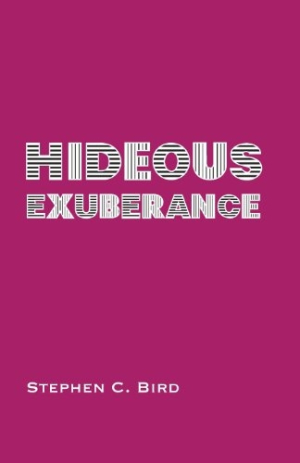
Hideous Exuberance
The universe of Hideous Exuberance, the new novel by Stephen C. Bird, is one of demented imagination and verve. It can also be exhausting. The work lies somewhere between Harry Potter burlesque and Tolkien satire, with doses of hill-country buffoonery and pop-culture mockery thrown in for good measure. The result is a psychosexual storm of non sequitur that is vaguely reminiscent of the nonsense novels of Stephen Leacock. Yet unlike Leacock’s work, Hideous Exuberance is decidedly adult.
Sets of loosely connected episodes relate the (mainly sexual) adventures of the novel’s often magical characters. The Harry Potter connection appears throughout in characters with oddly familiar names like Higher Parterre, Whoremoania Gangster, Gryffynwhore, and more.
The stories are unpredictable and varied, always told in frenetic, looping language. In “Szczmawgwhore(ts): A Pornographik Bitch-Story,” a young woman’s magical sexual ordeals are detailed. In “Glowing Green Gas,” a city besieged by “flaming raptor feces” must rally. In “Gandolphus Clownhouse,” a man wrestles with his sexuality. In “Volodya Gufo Y La Familia,” a mother and son struggle with elicit obsessions while changing into komodo dragons and teleporting around the world.
Yes, Bird’s Hideous Exuberance is a bird of a different color. It could have been a fascinating trip through a crazed, postmodern world, but is impaired by several flaws. Following its countless alternative spellings, its puns within puns, its allusions, and its many tangents is infuriating. The book would benefit from fewer instances of wordplay. Taken in bulk, the impact flags. For example, when some students dream of their futures, one wants “to learn the ways of hypocritickal Evilangelists and move up in the ranks of I-PORN-DEE-NET [the International Pornographick Distribution Network].” Another envisions himself as “a ruthless C-E-I-E-O, dedicated to the environmental rape of Third World Szczmoogle-Bjzhorg lands.”
The author also uses creative punctuation and multiple subclauses to enrich his narratives. In “The Travails of Ginger Bocey,” he writes, “when her were caught stealin the last pair of poor woman’s Tinseltown sunglasses from the pharmacy down Main Street of Boresaw, New York, her eyes turned mercury silver and her tongue shot out of the front door like a fearsome tentacle of a giant squid to burn and sting insolent 11 year old boys that was doin wheelies outside.”
Bird also plays fast and loose with point of view. In a single story, he may flip back and forth between third person limited with two or even three characters and then rise into the omniscient for good measure. If he were to stick with the perspective of one or two characters per story, each tale could have more impact, more humor, and better readability.
All in all, Bird’s novel could be developed and polished to appeal to mature audiences with a taste for the peculiar.
Reviewed by
Leia Menlove
Disclosure: This article is not an endorsement, but a review. The publisher of this book provided free copies of the book and paid a small fee to have their book reviewed by a professional reviewer. Foreword Reviews and Clarion Reviews make no guarantee that the publisher will receive a positive review. Foreword Magazine, Inc. is disclosing this in accordance with the Federal Trade Commission’s 16 CFR, Part 255.
